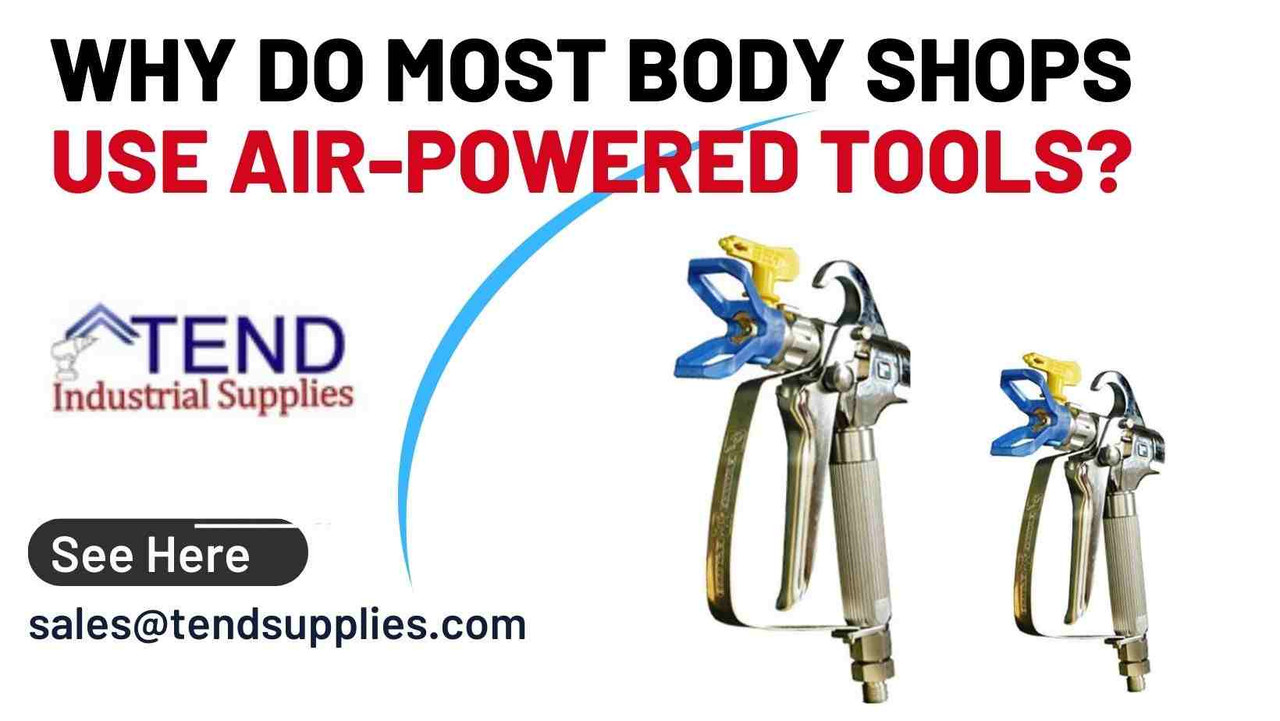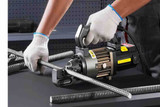Why Do Most Body Shops Use Air-Powered Tools?
Why Do Most Body Shops Use Air-Powered Tools?
Key takeaways
- Air-Powered Tools are Powerful and Efficient:
- Durability of Air-Powered Tools
- Comparison with Electric and Manual Tools
- Choosing the Right Air-Powered Tools
Introduction
In the world of automotive repair and bodywork, the tools of the trade are as diverse as the tasks at hand. From wrenches to spray guns, a wide array of tools is used to repair, restore, and refine vehicles. Air-powered tools, also known as pneumatic tools, hold a special place. For good reasons, they are a common sight in body shops worldwide and even mechanic workshops. Air tools are also better used in mechanic workshops because they have power, speed, versatility, durability, and precision. The strength of air-powered tools alone makes them ideal for working on large or stubborn bolts and nuts that would be difficult to remove with hand tools. Discover why most body shops prefer air-powered tools in our comprehensive guide. Learn about the power, efficiency, and durability of these tools, and understand how they compare to electric and manual alternatives. Find out how to choose the right air-powered tools for your body shop and how to maintain them for optimal performance. Enhance your productivity with Tend Industrial Supplies' range of high-quality air-powered tools.
Understanding Air-Powered Tools
Air-powered tools are devices that use the force of compressed air to perform work. They are powered by an air compressor pressuring air into a storage tank. When the tool is activated, the compressed air is released, and the resulting force is used to drive the tool's mechanism.
Many air-powered tools are used in body shops, each designed for specific tasks. Some of the most common include impact wrenches, ratchets, grinders, sanders, and spray guns. Each of these tools offers unique advantages that make them well-suited to the demanding environment of a body shop.
Impact wrenches and ratchets, for example, provide high torque output perfect for loosening or tightening bolts and nuts. Grinders and sanders, on the other hand, are used for smoothing surfaces and removing excess material. Spray guns are essential for applying paint and other finishes. Air-powered tools are not only versatile but also decisive. They can deliver more torque than their electric counterparts and are often more durable. This is particularly important in a body shop setting, where tools are frequently used and can take a beating.
The following sections will delve deeper into why air-powered tools are preferred in most body shops. Stay tuned as we explore these tools' benefits and advantages over their electric counterparts.
The Advantages of Air-Powered Tools in Body Shops
Air-powered or pneumatic tools are standard in body shops for several reasons. They are powered by compressed air, which makes them incredibly powerful. This power allows them to handle the heavy-duty tasks often required in a body shop, such as removing or tightening large bolts, cutting through metal, or grinding down surfaces.
One of the critical benefits of air-powered tools is their efficiency. They can deliver more torque than their electric counterparts and do so consistently without the risk of overheating. This means they can work faster and more effectively, saving body shops valuable time on each job.
Durability is another significant advantage. Air-powered tools have fewer moving parts than electric tools, meaning less can go wrong. They are designed to withstand the harsh conditions of a body shop, from dust and debris to heavy use.
In the real-world setting of a body shop, these advantages make a significant difference. For example, an air-powered impact wrench can remove a stubborn bolt in seconds, whereas an electric or manual tool might struggle. Similarly, an air-powered grinder can quickly smooth down a welded joint, ready for painting.
Comparing Air-Powered Tools with Electric and Manual Tools
Air-powered tools often come out on top in a body shop setting compared to electric and manual tools. Electric tools, while portable and convenient, often can't match the power and durability of their air-powered counterparts. They can also overheat with heavy use, a common requirement in a body shop.
Manual tools, on the other hand, simply can't compete in terms of speed and efficiency. Tasks that can be completed in moments with an air-powered tool can take significantly longer with a manual tool.
However, it's important to note that each type of tool has its place. Electric or manual tools might be the better choice for smaller tasks or for mobile work where a compressed air supply is unavailable. But air-powered tools are often the preferred choice for heavy-duty, day-to-day tasks in a body shop.
In conclusion, air-powered tools' power, efficiency, and durability make them a valuable asset for any body shop. By understanding these advantages, body shops can make informed decisions about their tools, helping them work more effectively and efficiently.
How to Choose the Right Air-Powered Tools for Your Body Shop
Choosing the right air-powered tools for your body shop is a critical decision that can significantly impact your productivity and efficiency. Here are some factors to consider:
- Power and Performance: The power of an air tool is often measured in Cubic Feet per Minute (CFM) and Pounds per Square Inch (PSI). Make sure to choose tools that meet your power requirements for the tasks.
- Durability: Body shops are demanding environments, and your tools must withstand heavy use. Look for air-powered tools made from high-quality materials and with robust construction.
- Ergonomics: Using air tools can be physically demanding, so choosing comfortable tools for extended periods is essential. Look for features like anti-vibration handles and lightweight designs.
- Brand Reputation: Some brands are known for their reliable and high-performing air tools. Do your research and consider tools from reputable manufacturers.
Maintaining and using these tools effectively is also crucial. Regular maintenance, including proper lubrication and timely replacement of worn-out parts, can extend the life of your air tools and keep them performing at their best.
Conclusion
In conclusion, using air-powered tools in body shops is widespread due to their numerous advantages, including power, efficiency, and durability. While other tools have their place, air-powered tools often emerge as the preferred choice for many body shop tasks. Whether setting up a new body shop or upgrading your current tool collection, the benefits of air-powered tools are worth considering. With the right tools, you can enhance your productivity, deliver high-quality work, and ensure the satisfaction of your customers.
Call to Action
Ready to explore the benefits of air-powered tools for your body shop? At Tend Industrial Supplies, we offer a wide selection of high-quality air-powered tools designed to meet the demanding needs of body shops. Visit ourwebsite to browse our selection, or contact us at sales@tendsupplies.com for further inquiries or purchases. Equip your body shop with the best tools today and experience the difference in productivity and efficiency.









